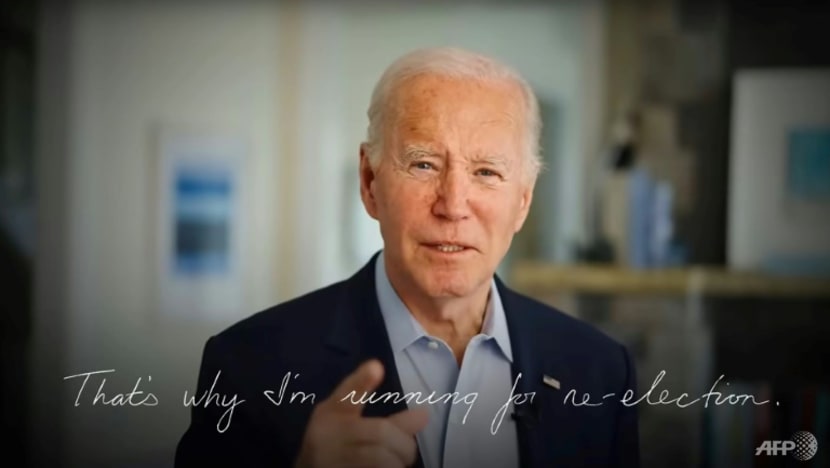Commentary: Like the US, Asia is less than enthusiastic about another Biden term
The majority of American voters believe US President Joe Biden should not run for re-election, while Asia’s hopes about the Biden administration have not been realised, says Trisha Craig of Yale-NUS College.

Joe Biden's re-election campaign video calls on Americans to back him for another four years (Photo: Biden Harris Presidential Campaign/AFP/Handout)
SINGAPORE: In one of the least surprising political announcements of the year, United States President Joe Biden officially stated on Tuesday (Apr 25) that he plans to seek a second term in office. For weeks, there were signals that pointed to his bid for re-election and this announcement puts to rest speculation about any other Democratic presidential candidate running for the White House.
On the face of it, this is politics as usual - an incumbent president running for re-election is hardly earth-shattering news. But this election is shaping up to be anything but normal.
First is the issue of Biden’s poll numbers. Despite a good start at the beginning of his presidency, they have been consistently worrisome, dropping below 50 per cent approval in August 2021 and never having recovered. They currently hover in the low to mid 40 per cent range, which the standards of conventional wisdom would suggest are too low to win.
There is widespread agreement among many Americans that they would prefer he not run. Survey results by NBC News released over the weekend show that 70 per cent of voters believe Biden should not, including a majority (51 per cent) of registered Democrats.
Why? For many, the issue is his age. At 78, he was the oldest person in US history to assume the presidency when he first took office and now at 80, the rigours of America’s protracted election process and gruelling cross-country campaign appearances are unlikely to assuage fears about his stamina.
Yet age may be less of a liability than it may seem since it appears increasingly likely that the country is headed for a repeat of the 2020 election with 76-year-old former president Donald Trump as the Republican candidate. This is a match-up for which the American public has very little appetite - 60 per cent, including a third of Republicans, do not wish to see Trump run again.
DONALD TRUMP’S GRIP ON THE REPUBLICAN PARTY
The country seems doomed to repeat the last election in part due to the peculiar grip that Trump has on a large part of the Republican party. Despite outstanding criminal indictments against the former president and the likelihood of more to come due to his role in the Jan 6, 2021 insurrection at the Capitol, Trump leads the pack of potential Republican candidates by a large margin.
Member of the Republican party and Florida governor Ron DeSantis, who has not yet announced his candidacy but is presumed to be running, has stumbled badly, in part because he has not countered Trump’s relentless attacks on him.
Coming off his re-election win in Florida, one of the few Republican bright spots in the November midterm elections that saw many Trump-backed candidates defeated, DeSantis was polling neck and neck with Trump.
Since then, his trajectory has been mostly downward and he trails Trump, who is the choice of almost half (46 per cent) of Republicans by a margin of 15 points. Other declared or presumed Republican candidates including former vice president Mike Pence, former South Carolina governor Nikki Haley, and South Carolina Senator Tim Scott barely register with percentages of support in the low single digits.
With almost nine months until the first presidential primary elections, there is still ample time for the field to shift for DeSantis. Yet his wobble highlights how hard it is for Republicans to gain ground against Trump. Fearful of alienating his deeply committed supporters, challengers hold their fire.
THE ONLY CANDIDATE CAPABLE OF BEATING TRUMP
For Democrats, there is a parallel dynamic of reactivity to Trump at work. Despite apprehensions about Biden’s age and fears about his low approval ratings, he is the only one who is seen as capable of beating Trump, shutting off the path for younger party hopefuls.
Certainly, Biden is credited with the party’s surprisingly good performance in November’s midterm elections. Typically, the incumbent president’s party loses substantial ground in the midterms, on average giving up 29 congressional seats. Yet under Biden, the Democrats did far better than predicted, relinquishing only nine House seats in the lower chamber House of Representatives, narrowly losing the majority and retaining control of the Senate.
Analysts attribute this to several factors including a resilient economy despite the challenges of inflation, a rejection of the extremism around the Capitol riot and election denial, the popularity of Biden policies like infrastructure investment and anger over the Supreme Court’s decision in June 2022 to roll back abortion rights.
Biden’s campaign will focus on similar themes, and highlight his accomplishments in areas like climate change, reducing prices of some prescription drugs, and COVID-19 relief.
And despite more people wishing Biden rather than Trump would sit the election out, Biden remains more popular. 38 per cent of Americans view him positively compared with 34 per cent for the former president, whose negative rating is also higher than Biden’s.
Still, it is by no means a slam dunk for Biden. Having lost the majority in Congress, he is unable to finish his legislative agenda. Republican Speaker of the House Kevin McCarthy is setting up a bruising battle over the federal debt ceiling, the economy still feels precarious to many Americans, and concerns like gun violence and immigration, typically weaknesses for Democrats, are top of mind.
ASIA’S HOPES ABOUT BIDEN ADMINISTRATION HAVE NOT BEEN REALISED
How does the rest of the world view the coming American gerontocracy? In Asia Pacific, particularly Southeast Asia, there is a sense that some initial hopes about the Biden administration have not been realised.
The relatively antagonistic stance of both the Trump and Biden administrations towards China, the failure to lower the temperature on the US-China relationship and the slow progress of any comprehensive trade agreements or US market access under the Biden administration after Trump’s withdrawal from the Trans-Pacific Partnership (TPP) have disappointed.
Still, efforts by administration officials like US Secretary of State Antony Blinken, Defence Secretary Lloyd Austin and Vice President Kamala Harris to visit the region, participate in summits and generally focus on a multilateral approach to regional security challenges is a welcome change from the Trump administration.
Under the Biden administration, there has been recent evidence of bipartisan attempts to install guardrails around the China relationship. Actions like a mild rebuke to China over the spy balloon incident in February or Speaker McCarthy’s decision to meet with Taiwan’s President Tsai in California rather than on Taiwanese soil are critical to avoid what former Morgan Stanley Asia chief Stephen Roach refers to as a catastrophic accidental conflict.
Just as many in the US are less than enthusiastic about another Biden run but see it as the antidote to the chaos of another Trump presidency, many in Asia share similar sentiments.
Trisha Craig is Vice President (Engagement) and Senior Lecturer of Social Sciences (Global Affairs) at Yale-NUS College. The views and opinions expressed herein are those of the author(s) and do not represent the views and opinions of Yale-NUS College or any of its subsidiaries or affiliates.




















